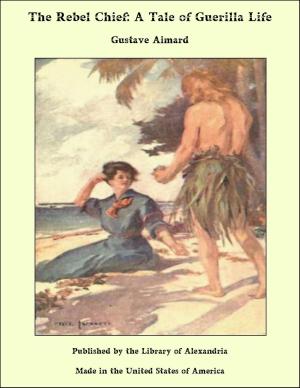The Young Surveyor; or, Jack on the Prairies
Nonfiction, Religion & Spirituality, New Age, History, Fiction & Literature| Author: | John Townsend Trowbridge | ISBN: | 9781465592293 |
| Publisher: | Library of Alexandria | Publication: | March 8, 2015 |
| Imprint: | Language: | English |
| Author: | John Townsend Trowbridge |
| ISBN: | 9781465592293 |
| Publisher: | Library of Alexandria |
| Publication: | March 8, 2015 |
| Imprint: | |
| Language: | English |
I 'lowed your boss would come himself, in place of sendin' a boy! muttered the old man, taking up the gun,—a light double-barrelled fowling-piece,—sighting across it with an experienced eye, and laying it down again. "Sal, bring the axe; it's stickin' in the log thar by the wood-pile. Curi's thing, to lose my section corner, hey?" "It's not a very uncommon thing," replied the young surveyor. "Fact is," said the old man, "I never found it I bought of Seth Parkins's widder arter Seth died, and banged if I've ever been able to find the gov'ment stake." "Maybe somebody pulled it up, or broke it off, to kill a rattlesnake with," suggested the young surveyor. "Like enough," said the old man. "Can't say 't I blame him; though he might 'a' got a stick in the timber by walkin' a few rods. He couldn't 'a' been so bad off as one o' you surveyor chaps was when the gov'ment survey went through. He was off on the Big Perairie, footin' it to his camp, when he comes to a rattler curled up in the grass, and shakin' his tarnal buzz-tail at him. He steps back, and casts about him for some sort of we'pon; he hadn't a thing in his fist but a roll of paper, and if ever a chap hankered arter a stick or a stun, they say he did. But it was all jest perairie grass; nary rock nor a piece of timber within three mile. Snake seemed to 'preciate his advantage, and flattened his head and whirred his rattle sassier 'n ever. Surveyor chap couldn't stan' that. So what does he dew, like a blamed fool, but jest off with his boot and hurl it, 'lowin' he could kill a rattler that way? He missed shot. Then, to git his boot, he had to pull off t' other, and tackle the snake with that. Lost that tew. Then he was in a perdickerment; snake got both boots; curled up on tew 'em, ready to strike, and seemin' to say, 'If you've any more boots to spar', bring 'em on.' Surveyor chap hadn't no more boots, to his sorrow; and, arter layin' siege to the critter till sundown, hopin' he'd depart in peace and leave him his property, he guv it up as a bad job, and footed it to the camp in his stockin's, fancyin' he was treadin' among rattlers all the way." The story was finished by the time the axe was brought; the old man picked up a rusty shovel lying by the house, and, getting into the buggy with his tools, he pointed out to his young companion a rough road leading through the timber. This was a broad belt of woodland, skirting the eastern side of a wide, fertile river-bottom, and giving to the settlement the popular name of "Long Woods." On the other side of the timber lay the high prairie region, covered with coarse wild grass, and spotted with flowers, without tree or shrub visible until another line of timber, miles away, marked the vicinity of another stream. The young surveyor and the old man, in the jolting buggy, followed by the dog, left the log-house and the valley behind them; traversed the woods, through flickering sun and shade; and drove southward along the edge of the rolling prairie, until the old man said they had better stop and hitch.
I 'lowed your boss would come himself, in place of sendin' a boy! muttered the old man, taking up the gun,—a light double-barrelled fowling-piece,—sighting across it with an experienced eye, and laying it down again. "Sal, bring the axe; it's stickin' in the log thar by the wood-pile. Curi's thing, to lose my section corner, hey?" "It's not a very uncommon thing," replied the young surveyor. "Fact is," said the old man, "I never found it I bought of Seth Parkins's widder arter Seth died, and banged if I've ever been able to find the gov'ment stake." "Maybe somebody pulled it up, or broke it off, to kill a rattlesnake with," suggested the young surveyor. "Like enough," said the old man. "Can't say 't I blame him; though he might 'a' got a stick in the timber by walkin' a few rods. He couldn't 'a' been so bad off as one o' you surveyor chaps was when the gov'ment survey went through. He was off on the Big Perairie, footin' it to his camp, when he comes to a rattler curled up in the grass, and shakin' his tarnal buzz-tail at him. He steps back, and casts about him for some sort of we'pon; he hadn't a thing in his fist but a roll of paper, and if ever a chap hankered arter a stick or a stun, they say he did. But it was all jest perairie grass; nary rock nor a piece of timber within three mile. Snake seemed to 'preciate his advantage, and flattened his head and whirred his rattle sassier 'n ever. Surveyor chap couldn't stan' that. So what does he dew, like a blamed fool, but jest off with his boot and hurl it, 'lowin' he could kill a rattler that way? He missed shot. Then, to git his boot, he had to pull off t' other, and tackle the snake with that. Lost that tew. Then he was in a perdickerment; snake got both boots; curled up on tew 'em, ready to strike, and seemin' to say, 'If you've any more boots to spar', bring 'em on.' Surveyor chap hadn't no more boots, to his sorrow; and, arter layin' siege to the critter till sundown, hopin' he'd depart in peace and leave him his property, he guv it up as a bad job, and footed it to the camp in his stockin's, fancyin' he was treadin' among rattlers all the way." The story was finished by the time the axe was brought; the old man picked up a rusty shovel lying by the house, and, getting into the buggy with his tools, he pointed out to his young companion a rough road leading through the timber. This was a broad belt of woodland, skirting the eastern side of a wide, fertile river-bottom, and giving to the settlement the popular name of "Long Woods." On the other side of the timber lay the high prairie region, covered with coarse wild grass, and spotted with flowers, without tree or shrub visible until another line of timber, miles away, marked the vicinity of another stream. The young surveyor and the old man, in the jolting buggy, followed by the dog, left the log-house and the valley behind them; traversed the woods, through flickering sun and shade; and drove southward along the edge of the rolling prairie, until the old man said they had better stop and hitch.















